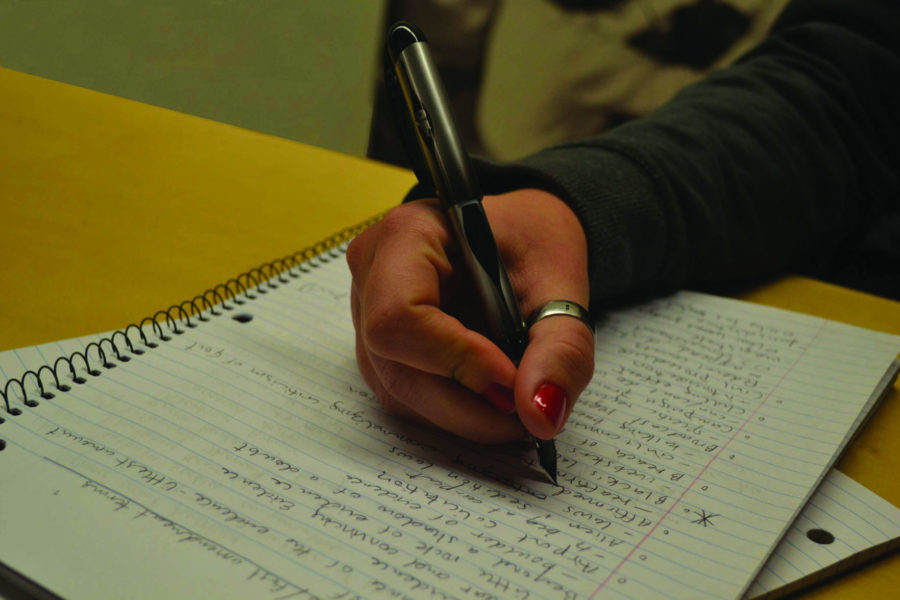Using technology in the classroom for note-taking
February 5, 2015
All the clicking and tapping of keys to keep up with notes during lecture may not be worth the effort.
While some professors and students might have different preferences on the best method to take notes, research shows that notes by hand may be more effective.
A study about the difference between note-taking on a laptop versus by hand, published in April 2014, found that summarizing lecture information long-hand leads to better retainment of information than typing out a lecture word for word.
The research was conducted by Pam Mueller, of Princeton University, and Daniel Oppenheimer, of University of California, Los Angeles, and titled “The Pen Is Mightier Than the Keyboard: Advantages of Longhand Over Laptop Note Taking.”
The pair conducted three studies using a total of 327 student participants from Princeton University and the University of California, Los Angeles.
Get The Daily Illini in your inbox!
In the first study, students were asked to watch a lecture on a screen and were told to take notes how they normally would by giving them notebooks and laptops to choose from. The students were then tested on both factual and conceptual information 30 minutes after the lecture. In the second study, the researchers told laptop users to “take notes in your own words and don’t just write down word-for-word what the speaker is saying,” and the students were tested 30 minutes after the lecture once more. The third study had students view a lecture with their preferred method of note-taking and returned a week later to be tested on the information. One group (with laptop and non-laptop users) was allowed to study the material before the test while the other was not.
The researchers found that using laptops for note-taking can have negative effects on educational assessments even when the laptop is being used to take notes faster. The students using laptops for notes did worse when answering conceptual questions.
Omoyele Ajayi, junior in Media, said she generally uses a laptop for note-taking, but added that she remembers more information when she takes notes by hand.
“When I take notes by my laptop, I usually cannot retain the information as much. I have to keep looking over my notes,” she said.
She said sometimes when the class is longer than 50 minutes, she gets distracted and visits websites, such as Facebook.
Ajayi said there can be positives and negatives to both forms of note taking: She can take notes faster on a laptop, but taking notes by hand during lecture pushes students to pick out the most important information.
Cynthia Steward, lecturer of accountancy, said it depends on the course, but normally she does not allow technology in her classrooms for notes unless there is an activity that requires the Internet.
“I like to have a very interactive classroom and so my experience is that students are distracted by screens,” Steward said.
Although she normally does not allow technology in the classroom, she is not against it; in her experience, writing notes by hand has helped her the most with learning.
“I will do things when I am taking notes by hand, like underlining or maybe drawing something to show the relationship between something, and for some reason, I think it connects with my brain better,” she said.
Dennis Baron, professor of English, said he does not have restrictions on technology students use to take notes in his classrooms. Although he notices students not paying attention in class, he said the issue is not necessarily technology related.
Baron said he frequently uses technology in his daily life and rarely writes by hand anymore.
“I depend totally on my computer — on my cell phone, on my tablet, in class when I’m giving presentations — pretty much the whole time,” he said. “I don’t see why students shouldn’t be allowed to do it too.”
Katherine Flowers, digital literacies coordinator for the Undergraduate Rhetoric Program, said the only rule she has about taking notes with technology in her class is to not disrupt others.
She said taking notes with paper could be more beneficial for some areas, such as drawing or math, but she believes typing works best for a lot of people who are just writing.
Overall, she said taking notes is more crucial than how people take notes.
“I think college is a good time for students to figure out what works best for them for taking notes.”
Ali can be reached at [email protected].







